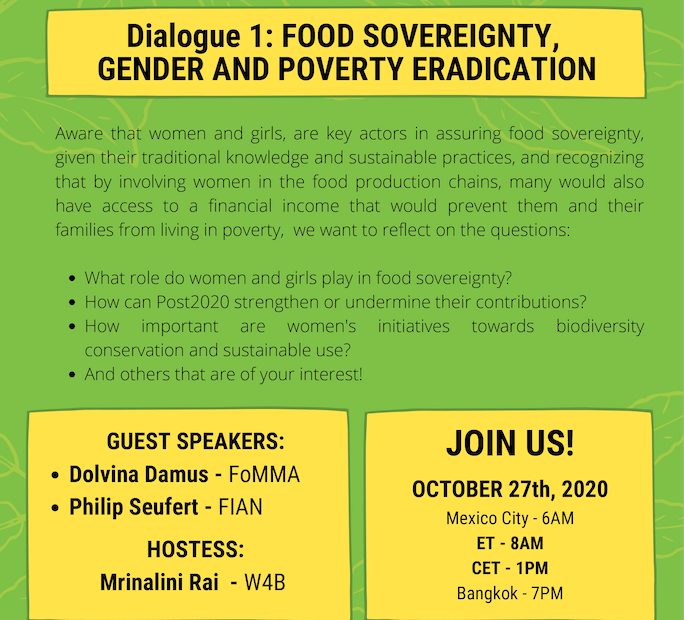Recognizing that there are gaps in the Post 2020 Global Biodiversity Framework related to Human Rights, which directly affect girls and women, and other groups such as indigenous peoples, local communities and youth; We will hold a series of dialogues to discuss how the post-2020 GBF could incorporate concrete elements to be effectively gender responsive. Each dialogue will involve guests speakers from the environmental community to jointly identify key elements that can be integrated into the next strategic plan of the Convention on Biological Diversity and beyond Post2020 for its effective and inclusive implementation.
Dialogue 1: Food sovereignty, gender and poverty eradication
Date: October 27, 2020 (Tuesday)
Time: Mexico City 6 AM // ET 8 AM // CET 1 PM // Bangkok 7 PM
Recording now available at our YouTube Channel.
Registration in advance https://us02web.zoom.us/meeting/register/tZcqduGurTMrHdWO6WnFyv-a99UNmrdjykIQ
After registering, you will receive a confirmation email with connection details.
*Interpretation will be provided in Spanish
Rationale
The terms food security and food sovereignty both aim to assure that people have access to an adequate amount of food. But while food security assures access to sufficient safe and nutritious food that meets dietary needs. Food sovereignty includes access to culturally appropriate food, ecologically sound and sustainable methods, and the right to define one’s own food and agricultural systems.
Aware that women and girls, are key actors in assuring food sovereignty, given their traditional knowledge and sustainable practices, and recognizing that by involving women in the food production chains, many would also have access to a financial income that would prevent them and their families from living in poverty,
We want to reflect on the questions:
- What role do women and girls play in food sovereignty?
- How can Post2020 strengthen or undermine their contributions?
- How important are women’s initiatives towards biodiversity conservation and sustainable use?
Guest speakers and hostess
FOMMA, 2020 Equator Prize Winners
Moderator : Mrinalini Rai/ Women4Biodiversity






Hi,
The webinar was just amazing, please share with me the presentations.
Regards
Thank you very much, we will be sending out the presentations and the recording to all participants.
Subject is important but time management was less than perfect. All presentation is well with less indigeneity which is missing in all level. Food is not only food it has diverse means, aesthetics, intrinsic, spiritual, religious, ceremonial, ritual, symbolic, language, culture, folklore, customs, traditional occupations, customary law/systems, traditions, wisdom, cosmology, knowledge, behaviors, sentiments and many more associated with indigenous peoples were not covered at all.
Thank you for your valuable comments and it is well taken. The focus of this webinar was on looking at the debates around food security and food sovereignty in the Post2020 GBF and on gender, as that is something we feel has not been highlighted enough. The case study was to also showcase how women, indigenous and rural women are undertaking on the ground. We do agree with your valid point that the link of food has many other aspects. This was the first part of the series of dialogues in which we will take on different aspects. We are happy to see the level of engagement and the interest and we hope that we might be able to address your and many others views and contributions to bring forth these relevant issues that you, yourself have highlighted. As for time, we hope to have them a bit longer for the upcoming dialogues – so please stay tuned.
I thought it was a great session just time too short to allow for adequate exploration of the very important topic…. It was good combination of a presentation focused on conceptual understanding and global advocacy (agroecology and the right to food) and a real case study that also speaks to the complexity of local indigeneity and the women’s market initiative in Borneo with economic, social, cultural, ecological/biodiversity aspects. Good format but next time more time for Q@A and also (it would be very interesting) cross-questions/comments between panelists. Many thanks to the organizers and Women4Biodiversity.
Thanks you Cristina for your feedback and we do acknowledged that there was a lot of richness of knowledge and so much intersectional issues that we need to look into. This also makes us realise that these discussions are not straight forward but do need an mult-pronged approaches. We hope to continue such dialogues to bring the voices from the ground and strengthen our collectives response to address these issues and concerns.
Poverty is defined as a situation in which people are unable to attain a minimum standard of living, is a growing problem in many case of developing country and especially in Africa. where many women live in poor households, and a higher proportion of the elderly poor are women. Women suffer from substantially higher unemployment rates than men. in the rural areas, they suffer particularly from lack access to land and services and as a result , poor rural women spend more than four hours a day fetching water and firewood.
the adoption of national policy framework for women Empowerment and gender Equality that focus on the alleviation of poverty must to integrate an approach which are a vital role to promote sustainable agriculture and rural development The strategy important in a long term should allow for increasing food production while conserving and managing biodiversity, to enhance capacity at the national level in support rural development due of constraints that women between irrigation, agricultural production and household, food security in the context multiple their livelihoods. The government and donor should still invest in irrigation schemes, access to irrigation and household food security. Across all cultural, political, economic and environmental. promote water management for sustainable agricultural production in order to support women(s participation in agricultural activities and for the decision makers to formulate effective policies for increasing productivity capacity with regard of the significant role women play in soil fertility and water management in the region . provide information for the development of strategies for women’s empowerment in agricultural decision-making.